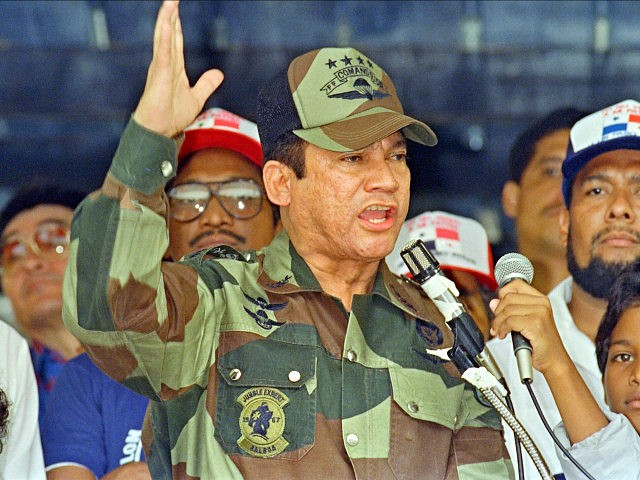Former Panamanian dictator Manuel Antonio Noriega’s death was announced in a tweet from current President Juan Carlos Varela on Tuesday.
Noriega, 83, died around 11:00 P.M. on Monday at Santo Tomas Hospital in Panama City, according to a hospital employee who spoke to the New York Times.
Although no official cause of death has been announced at the time of this writing, CNN notes Noriega underwent a difficult operation to remove a brain tumor in early March and was placed in a medically induced coma to deal with severe brain hemorrhaging incurred during the surgery.
Noriega needed special legal dispensation to receive the surgery because he has been jailed on charges including murder and corruption since returning to Panama in 2011. The New York Times offers a pithy summation of the former dictator’s salad days:
It was an inglorious homecoming for a man who had been known for brandishing a machete while making defiant nationalist speeches and living a lavish, libertine life off drug-trade riches, complete with luxurious mansions, cocaine-fueled parties and voluminous collections of antique guns. It was a quirky life as well: He liked to display his teddy bears dressed as paratroopers.
Alas, Noriega’s eccentricities were not limited to teddy bear couture. He raked in a fortune measured in hundreds of millions of dollars by selling information to both the United States and its adversaries — helping the nascent U.S. drug war one day, selling Panamanian passports to communist spies the next.
As NPR puts it, Noriega wore labels including “military commander, drug trafficker, CIA informant, dictator,” and “convicted murderer.” The murder and torture of political opponents helped bring Noriega’s long game to a close, along with his involvement in the drug trade and the little matter of the Panama Canal’s impending reversion to Panamanian ownership.
NPR quotes an illuminating comment Noriega made:
“The United States understood that Noriega is not the same man that was lieutenant colonel,” Noriega told American filmmaker Oliver Stone, who interviewed him in a U.S. federal prison in 1993. “Now he is commander in chief and said ‘no’ to our interests. And he is not our man.”
The General — he always left the titular presidential leadership of Panama to a disposable puppet — got into U.S. federal prison from Panama by way of the United States military, which launched Operation Just Cause on President George H.W. Bush’s orders in 1989.
In addition to the drug trafficking charges against Noriega, there were concerns about the safety of the approximately 35,000 Americans in Panama. As President Bush noted in his address to the nation, Noriega publicly threatened American lives and declared his nation to “be in a state of war with the United States,” after which his forces shot and killed an off-duty U.S. Marine.
Noriega also provoked the invasion by nullifying an election and preventing the new Panamanian president and vice president from taking office. When they protested this injustice, Noriega’s “Dignity Battalions” beat them up. The elected president who assumed office after Noriega was removed, Guillermo Endara, died in 2009.
Operation Just Cause was swift, lasting only from December 20, 1989, to Noriega’s surrender on January 3, 1990, but it was not bloodless. Twenty-three U.S. soldiers and three American civilians were killed, along with an estimated 150 soldiers of Noriega’s Panamanian Defense Force and 500 civilians. There remains some dispute about the number of Panamanian civilians killed, with some insisting it was much higher than the official estimate.
The operation famously ended with Noriega holed up at the Vatican’s embassy in Panama City, surrounded by American troops who blasted loud music at the building until he eventually surrendered. As NPR recalls, one of the songs they used was “Never Gonna Give You Up” by Rick Astley, making Noriega the first dictator to be Rickrolled.
The PDF was wiped out by the war, as President Endara ordered its dissolution once he assumed office. Endara also stripped Noriega of his military rank, leaving him identified only as “Federal Prisoner 41586” when he landed in Florida courtrooms. His mugshot became a symbol of dictatorial downfall, although few dictators seem to have drawn any positive lessons from it.
Noriega was sentenced to 40 years in prison on counts of drug trafficking, money laundering, and racketeering — the first foreign head of state to be convicted of criminal charges in the United States. He got out after 17 years for good behavior, then faced money-laundering charges in France for his purchase of expensive real estate with drug money. Panama got its crack at jailing him for human rights violations in 2011.
On top of everything else, he was accused of practicing witchcraft with a Brazilian enchantress. During his trial in the United States, he became a high-profile convert from nominal Catholicism to evangelical Christianity, which may have been somewhat vexing to the Vatican embassy staffers who endured high-volume Rick Astley music to give him sanctuary.
Noriega’s long, bizarre, bloody career will be grist for American political arguments for decades to come, as decisions made across several U.S. administrations from the seventies to the late eighties are examined. According to the Washington Post, Panamanians are largely “indifferent” to his death, although some families wonder if all of his victims will ever be fully accounted for. The current Panamanian government maintains he was never legitimately ruled the head of state, so no commemorative day off from work will be granted due to his death.
As one woman old enough to remember the Noriega regime put it, “He had already suffered greatly. He had paid. What more could they do to him? God knows what he will do with him.”

COMMENTS
Please let us know if you're having issues with commenting.